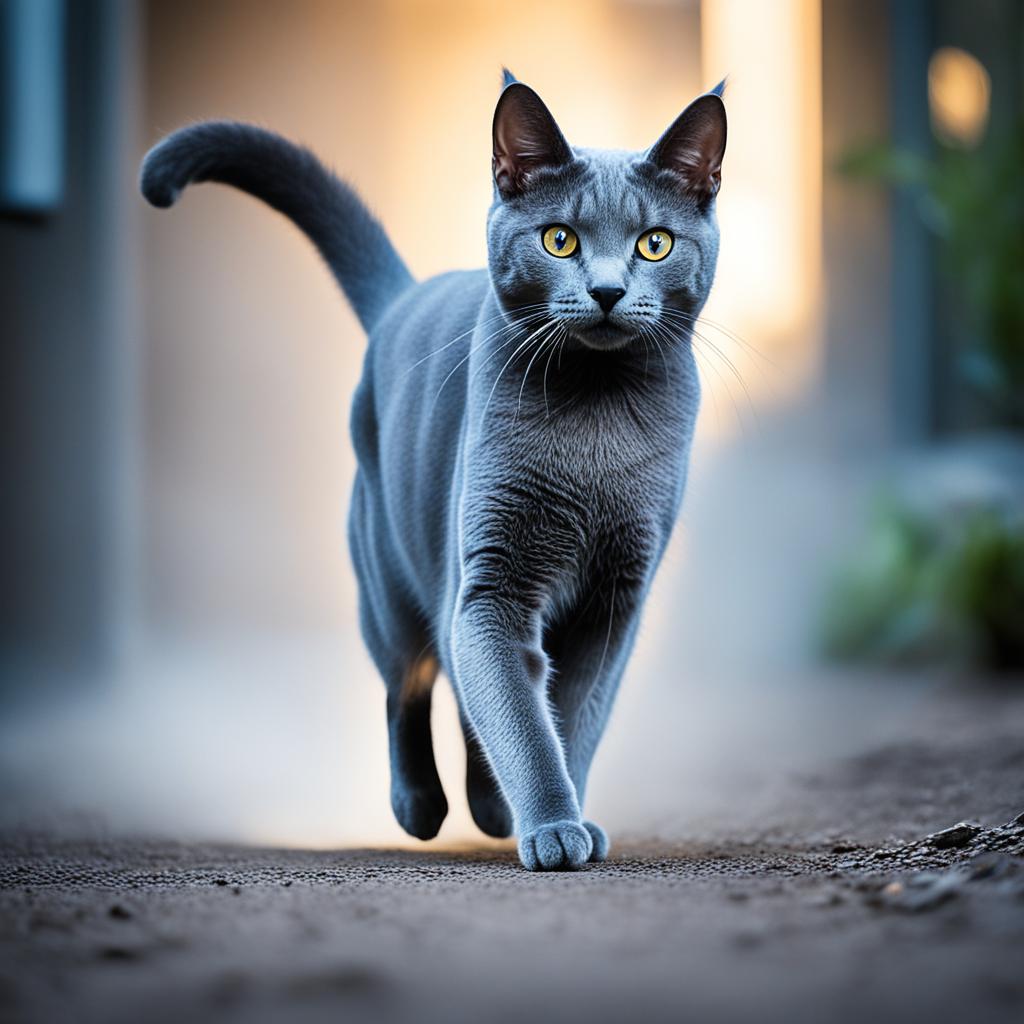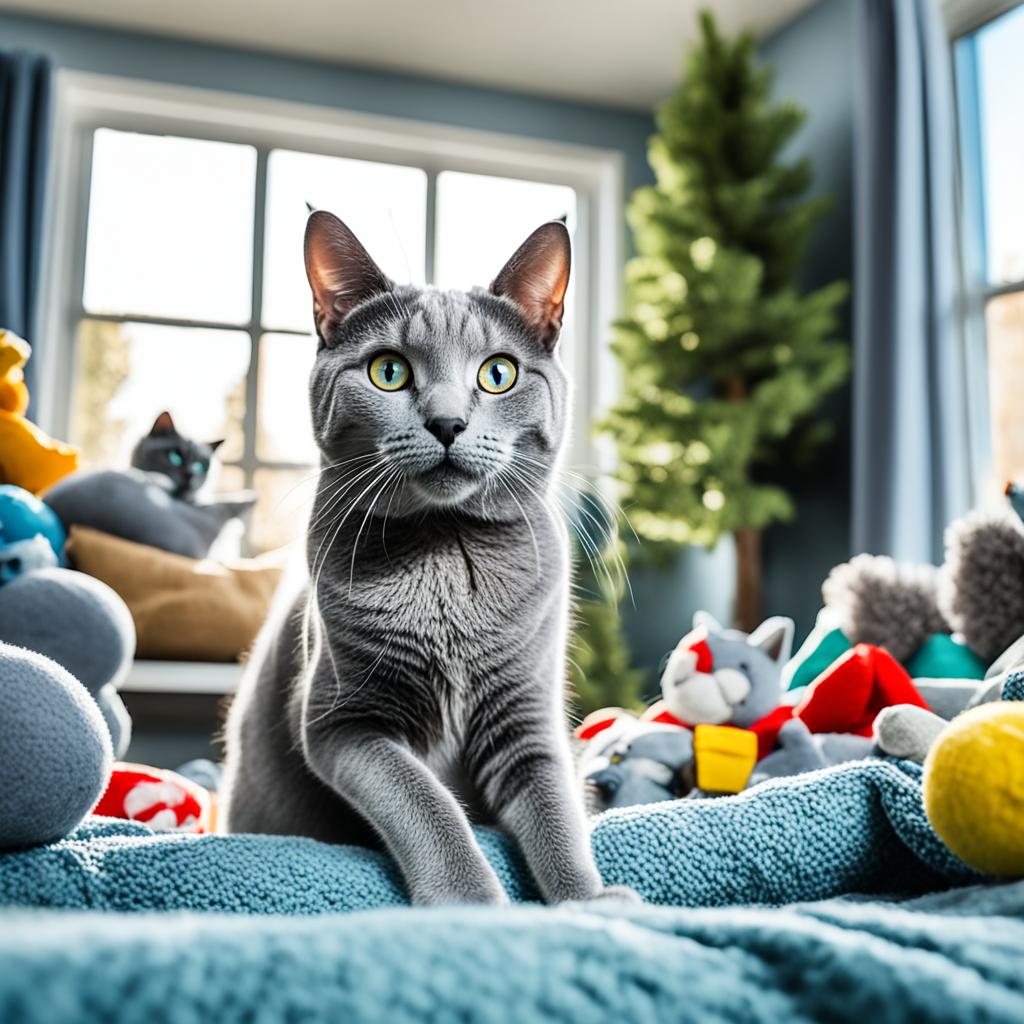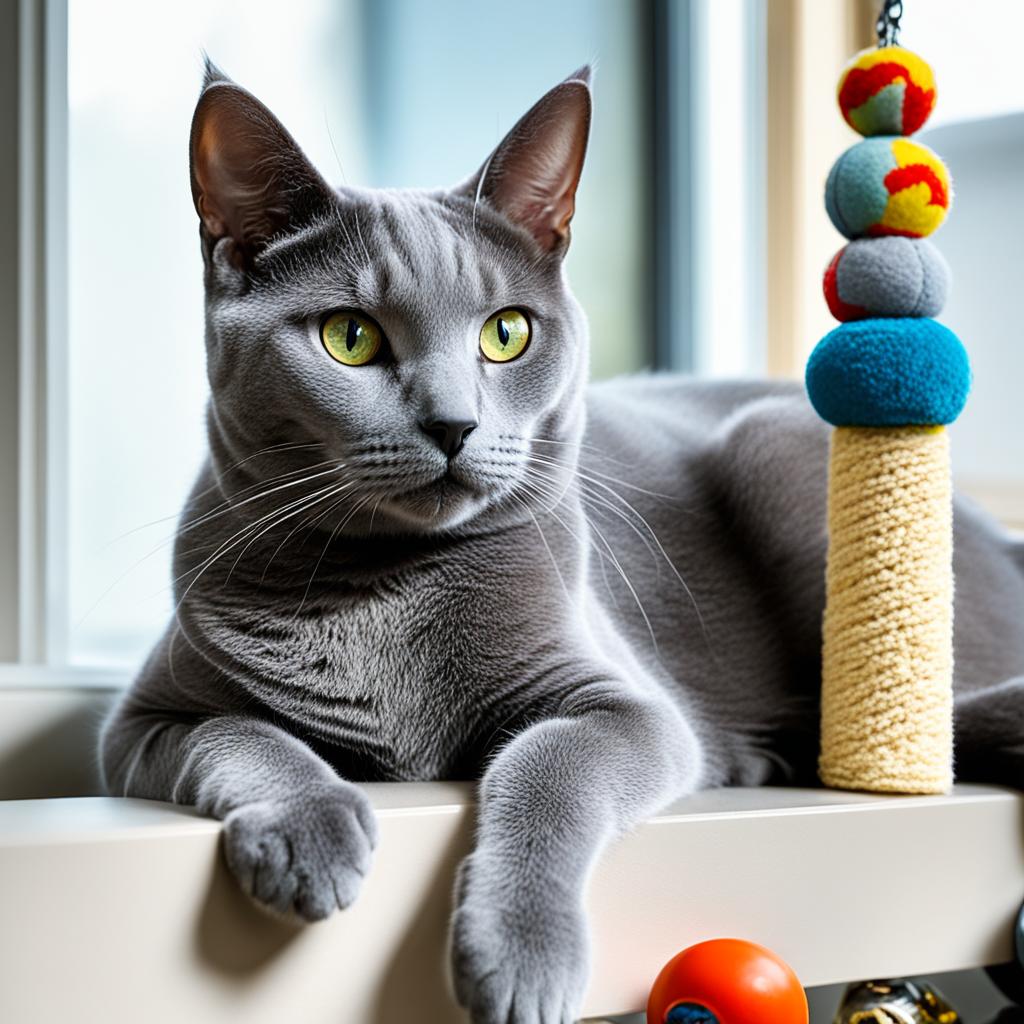Russian Blue cats are known for their interesting habits, especially tail chasing. This behavior is not just for fun. It shows more about the cat’s feelings and instincts. Ever seen your Russian Blue with a toy, yowling, then dropping the toy without reason?
This may seem like a game or a cry for help. But, it’s often a way for them to act on hunting instincts or deal with changes or stresses. Understanding why they do this can shed light on their inner world.
Key Takeaways
- Russian Blue cats often engage in tail chasing due to their natural hunting instincts.
- Yowling at night with a toy may be a sign of stress or change.
- This can help the cat adjust to new situations.
- By understanding these actions, you can make your home a better place for your cat.
- Watching these moments can tell you a lot about your cat’s mental health.
The Unique Traits of Russian Blue Cats

Russian Blue cats are known for their elegance, mystery, and smarts. They not only look amazing, but they have a unique way of acting that makes them stand out. Let’s look at why these cats are so special.
Physical Attributes
Russian Blue cats are truly mesmerizing to look at. They have a sleek, graceful body like a little panther. Their coat shines with a beautiful bluish-grey color. Round, green eyes and a strong build make them look like the cat version of a Doberman Pinscher.
Their faces always look like they’re smiling mysteriously. Watching them move is like seeing a dance, showing off their elegant and unique traits.
Personality and Temperament
The Russian Blue cat’s personality is as fascinating as their looks. They can be shy with new people, but with friends and family, they are loving and gentle. They often pick one person to be very close to, showing their loyalty and affection.
These cats are smart and like keeping to a routine. They love being around their family, but they don’t like sudden changes. It’s important to keep their lives consistent to avoid stress. This could help them avoid behaviors like chasing their tails.
The Typical Habits of a Russian Blue Cat

Russian Blue cats love their routines. They are very precise with their grooming and eating times. This shows in how they carefully groom themselves and expect meals at regular times.
Daily Routines
Your Russian Blue cat will act like clockwork for their daily tasks. They prefer a clean litter box and meals served like clockwork. They need a neat home which matches their tidy habits.
- Mornings start with grooming, which keeps their blue coat shiny.
- They always eat a hearty breakfast, craving a consistent schedule.
- Playtime happens next, which satisfies their hunting instincts.
- Afternoons are for long, restful naps in quiet places.
- Evening play or cuddles and a final meal wrap up their day.
Unique Behaviors
Russian Blue cats have some quirky habits. They might yowl while carrying toys around. This could be them tapping into ancient hunting instincts. It may sometimes look like they’re chasing their tails. But, watching their everyday life can explain these antics.
“Bringing toys as ‘gifts’ may be their way of showing off their prized possessions or hinting at an innate hunting skill.”
The mix of their routine life and wild instincts means they do interesting things. By mixing daily feline routines with fun, you make them happy. They need both to be healthy and joyful.
Understanding Your Cat’s Tail Chasing Behavior

Why does your cat, especially Russian Blues, love to chase its tail? Is it just for fun or something more? To understand, we must explore the cat tail chasing reasons.
Mostly, in Russian Blues, tail chasing is about playing. They are naturally curious and lively. For them, a moving tail can be too tempting to ignore. But, there’s deeper meaning here too.
Looking into a Russian Blue’s tail chasing means looking at their life. Big changes or even small upsets can stress them. Tail chasing might be their way of dealing with this stress.
To really grasp why your Russian Blue is chasing its tail, watch closely. Patterns in the time, place, or recent events may show you the cause. This can help you understand your cat better.
| Cat Tail Chasing Reasons | Implications |
|---|---|
| Playful Behavior | Natural and harmless, linked to high energy levels. |
| Stress | A reaction to changes in environment or routine, signaling the need for stability. |
| Boredom | Lack of stimulation and engagement leading to self-entertainment. |
| Health Issues | Requires monitoring; persistent chasing may indicate discomfort or medical concerns. |
The next time you see your Russian Blue chasing its tail, think through these ideas. By observing and understanding your cat’s behavior, you can find ways to engage them. This can make living with your Russian Blue even more enjoyable.
Why Does My Russian Blue Cat Chase Its Tail?

Do you wonder why your Russian Blue cat can’t stop chasing its tail? It’s a mystery for many cat owners. This behavior is often a sign they have extra energy and their hunting instincts are kicking in.
Pent-Up Energy
Russian Blue cats chase their tails when they have too much energy. These cats are full of life. If they don’t get enough playtime or exercise, they might start chasing their own tails. It’s like they turn themselves into a game to burn off steam.
Playful Instincts
Playfulness is key for Russian Blues. They love to hunt, and tail chasing simulates this. It’s both fun and a way to stay sharp. So, when you see your cat doing this, know they’re letting their playful instincts run wild.
Psychological Reasons Behind Tail Chasing
Your Russian Blue cat’s tail chasing might look cute and funny. But, there are deeper reasons why a cat might do this. Knowing these reasons can help you make your cat feel more at ease.
Stress and Anxiety
Stress and anxiety in cats often show up in tail-chasing. Your cat might be stressed from big changes, like new pets or people. Moving or changes in its daily routine can also trigger this.
These changes can throw your cat off balance. So, it turns to tail chasing as a way to cope. Keeping your cat’s life steady and predictable can lessen these behaviors.
Boredom
Cats are natural hunters and need ways to engage their minds and bodies. Without proper stimulation, they might turn to tail chasing out of boredom. This shows they want more attention from you.
To battle this, make sure your cat has toys and playtime. Giving them puzzles or challenges can also keep their minds off of their tails.
The Hunting Instincts of Russian Blue Cats

Russian Blue cats have a strong hunting instincts. It comes from their genes. When your cat chases its tail, it’s part of these ancient hunting skills. Mother cats teach their babies to hunt by bringing them prey. Even as pets, Russian Blue cats can show this through tail chasing.
Predatory behaviors in felines aren’t just about surviving in the wild. They play a big part in their fun games. By stalking toys or diving at shadows, cats act how they would in nature. So, tail chasing is a sign of their natural cat instincts, even if they can’t find live prey.
Let’s learn more about how tail chasing is linked to hunting skills.
| Predatory Behavior | Domestic Display |
|---|---|
| Stalking | Quietly moving towards toys or moving objects |
| Pouncing | Sudden leaps onto objects or feet! |
| Playing with Prey | Batting toys around the house |
| Tail Chasing | Running in circles trying to catch their own tail |
Knowing about these natural cat instincts helps you understand your Russian Blue’s playfulness. It reveals why their behavior is so interesting and fun to watch. Their link to the wild is truly captivating.
Health Concerns Linked to Tail Chasing

Seeing your Russian Blue chase its tail is cute. But, it could point to health issues. If this happens a lot, check on your cat’s health.
Some tail chasing is no big deal. But, don’t ignore it completely. Too much tail chasing could mean your cat is uncomfortable or anxious. So, a trip to the vet is very important.
Watch for other signs of stress or discomfort. This will help keep your Russian Blue healthy and happy. Enjoy your cat’s fun behavior worry-free.
Methods to Prevent Your Russian Blue Cat from Tail Chasing

No one wants to see their trusty Russian Blue cat chase its tail all day. Figuring out how to keep your cat happy and healthy is key. This involves creating an environment that keeps your cat active and engaged.
Regular Playtime
A key step is regular playtime. This keeps preventing tail chasing in cats. Use fun toys to keep your cat moving and stop the urge to chase their tail.
- Interactive toys like feather wands
- Laser pointers for high-energy chases
- Treat-dispensing toys
Mental Stimulation
Keeping your cat’s brain busy is just as important. Use a variety of activities to keep your cat sharp and happy.
Try these:
- Puzzle feeders to challenge your cat
- Cat trees and tunnels for exploration
- Frequent changes in toys to keep them interested
Making sure your cat is active and mentally stimulated can reduce tail chasing. This hands-on approach boosts their well-being and keeps them content.
The Role of Diet and Exercise in Cat Behavior

Making sure your Russian Blue is happy and healthy goes beyond cuddles and play. Diet and exercise are key for your cat’s behavior and health. We’ll look at how eating right and staying active help your cat feel and act better.
Balanced Diet
A good diet is the foundation of any cat’s well-being. For Russian Blue cats, a diet full of key nutrients is very important. It doesn’t just keep them physically healthy, it affects their behavior too.
This diet mixes proteins, fats, vitamins, and minerals the right way. This quality food keeps your cat’s energy up. This lowers the chance of them showing bad behaviors like chasing their tails. Such behaviors can come from not getting all the nutrients they need.
Importance of Physical Activity
Making sure your Russian Blue stays active is vital. Cat physical activity helps them stay at a healthy weight. This is key to their overall health, keeping their mind and body in good shape.
Exercise also keeps them mentally sharp and prevents them from getting bored. Daily playtime reduces their stress and anxiety. This leads to better all-around behavior and health.
Think about these benefits of a good diet and staying active for your cat:
| Aspect | Benefits |
|---|---|
| Balanced Diet | Supports overall health, boosts energy, reduces behavioral issues |
| Physical Activity | Maintains healthy weight, reduces stress, provides mental stimulation |
Focusing on the right food and enough exercise make your Russian Blue healthier and happier. This cuts down on bad behavior and makes their life more balanced.
Environmental Enrichment for Your Russian Blue Cat

It’s vital to enrich the environment for your Russian Blue cat. Doing so supports their health and happiness. It’s fun for both of you too.
Creating an enriched environment is easy. You can do this by adding engaging activities and items. For example, bird feeders by the window mimic hunting, which they love.
Add vertical space at home with shelves or cat trees if you have the room. Russian Blues adore climbing. This type of space makes them happy. Changing their toys often keeps their interest alive too.
| Enrichment Item | Benefits |
|---|---|
| Puzzle feeders | Mental stimulation and prolonged eating time |
| Cat trees and shelves | Physical activity and exploration |
| Rotating toys | Variety and continuous engagement |
| Bird feeders outside windows | Natural hunting instincts stimulation |
Regular playtime is key as well. Use toys like laser pointers or feather wands to have fun with your cat. You can also try catnip or silvervine to add more excitement.
Make it a point to keep their environment fresh and engaging. Your Russian Blue will benefit a lot from these efforts. They’ll be a happier and healthier pet because of it.
Common Myths About Russian Blue Cat Behavior
You might have heard many stories about Russian Blue cats. Some sound like they’re from a fairy tale. But do they hold any truth? Let’s explore these myths and discover what’s real.
Tales of Mystical Origins
One fascinating myth is their supposed mystical origins. Some say Russian Blue cats can heal or bring good luck. While these stories make the breed even more interesting, no science proves these claims.
Popular Misconceptions
There’s a myth that says Russian Blue cats are always calm. But, in truth, they can be as lively as any other cat. They’re often labeled as shy or distant. Yet, with love and socializing, they turn out to be very loving and loyal.
| Myth | Reality |
|---|---|
| Russian Blues have mystical powers | No scientific evidence supports this |
| They’re always calm | They can be as playful as any other breed |
| They prefer to be alone | They can form strong bonds with owners |
Conclusion
Understanding your Russian Blue starts with their peculiar actions, like chasing their tails. These habits offer amazing clues into their instincts. Sometimes, these actions are not just fun, they might show signs of stress or health troubles.
Russian Blue cats are not just good-looking; they have a captivating charm. They love having a schedule and need mental challenges. By knowing this, you can keep your pet happy and healthy.
Also, make sure they eat well and stay active. This helps keep bad behaviors at bay and boosts their health. Watch how they act and change their space to meet their needs. This way, you grow a strong bond with your fascinating Russian Blue friend.
FAQ
Why does my Russian Blue cat chase its tail?
Tail chasing in Russian Blue cats can be playful or release energy. It might also come from their hunter’s instinct or if they’re bored or stressed. Accmex.com has some great tips on this.
What are some unique traits of Russian Blue cats?
Russian Blue cats have a unique look. They have slender bodies and stunning green eyes. Their fur is a beautiful bluish-grey. These cats are smart, loving, and enjoy a steady routine.
How do the typical habits of a Russian Blue cat manifest?
These cats love a set routine. They like a clean litter box and food at the same time every day. You might also see them yowl with their toys, showing their natural hunting ways.
What psychological reasons might cause my Russian Blue cat to chase its tail?
Stress and boredom could make your cat chase its tail. Big changes at home or not enough mental challenges can trigger this behavior. Providing a loving and engaging home can help.
How important is regular playtime for preventing tail chasing in Russian Blue cats?
Playing often is vital for stopping tail chasing. Good toys and play not only give them fun but also work their mind and body. This keeps them from feeling stressed and bored.
What role does diet and exercise play in my cat’s behavior?
A healthy diet and lots of exercise are crucial for your cat’s mood and behavior. Eating right and staying active helps them stay a healthy weight. This avoids issues like obesity and stops unwanted habits.
Could my Russian Blue cat’s tail chasing indicate a health issue?
If your cat chases its tail a lot, it might be unwell. Have a vet check them to make sure there are no physical problems causing this action.
How can environmental enrichment help my Russian Blue cat?
Setting up a cool space with fun toys and places for them to explore can make a big difference. It keeps their brain sharp and stops them from getting bored, which can lead to tail chasing.
Are there any common myths about Russian Blue cat behavior?
Yes, there are myths about Russian Blues, like they have magical beginnings or are too serious. Knowing the truth about these cats helps you take better care of them and build a deep bond.




